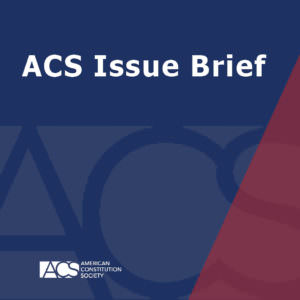EXTRAORDINARY CIRCUMSTANCES: The Legacy of the Gang of 14 and a Proposal for Judicial Nominations Reform
Samuel Ashe Distinguished Professor in Constitutional Law, University of North Carolina School of Law
S. Walter Richey Professor of Corporate Law, University of Minnesota Law School
November 1, 2011
 ACS is pleased to distribute “EXTRAORDINARY CIRCUMSTANCES: The Legacy of the Gang of 14 and a Proposal for Judicial Nominations Reform,” an Issue Brief by Michael Gerhardt, Samuel Ashe Distinguished Professor in Constitutional Law and Director of the Center for Law and Government at the University of North Carolina School of Law, and Richard Painter, S. Walter Richey Professor of Corporate Law at the University of Minnesota Law School. In the Issue Brief, the authors look back at the bipartisan deal struck by senators in 2005 to avoid a revision of the Senate rules that would have radically altered the way the Senate does business. In agreeing not to support judicial filibusters unless there were “extraordinary circumstances,” the Gang of 14, as the senators became known, helped provide the Senate a way to discharge their constitutional responsibility of Advice and Consent. However, in President Obama’s first two and a half years in office, his judicial nominations have been subjected to various delays and obstruction, including a successful filibuster upheld by each of the remaining Republican members of the Gang of 14.
ACS is pleased to distribute “EXTRAORDINARY CIRCUMSTANCES: The Legacy of the Gang of 14 and a Proposal for Judicial Nominations Reform,” an Issue Brief by Michael Gerhardt, Samuel Ashe Distinguished Professor in Constitutional Law and Director of the Center for Law and Government at the University of North Carolina School of Law, and Richard Painter, S. Walter Richey Professor of Corporate Law at the University of Minnesota Law School. In the Issue Brief, the authors look back at the bipartisan deal struck by senators in 2005 to avoid a revision of the Senate rules that would have radically altered the way the Senate does business. In agreeing not to support judicial filibusters unless there were “extraordinary circumstances,” the Gang of 14, as the senators became known, helped provide the Senate a way to discharge their constitutional responsibility of Advice and Consent. However, in President Obama’s first two and a half years in office, his judicial nominations have been subjected to various delays and obstruction, including a successful filibuster upheld by each of the remaining Republican members of the Gang of 14.
“The Gang of 14 had hoped that their bipartisan compromise would facilitate judicial appointments and remove ideological differences as a ground of objection to a nomination as long as the nominee’s views were within the mainstream of American jurisprudence and he or she had sound character and no serious ethical lapses,” write Gerhardt and Painter. “Instead, judicial filibusters, among other means of obstruction within the Senate, have been persistently directed at judicial nominees on the basis of speculation and distortion. These tactics have prevented the federal judiciary from operating at full strength, and have made the process of judicial selection unpredictable for everyone concerned, including the White House, the Senate, and the nominees.”
The authors conclude with a proposal on how to reform the judicial nominations process, so as to prevent any further damage to the federal judiciary and the Constitution.
Read the full Issue Brief here: EXTRAORDINARY CIRCUMSTANCES: The Legacy of the Gang of 14 and a Proposal for Judicial Nominations Reform
